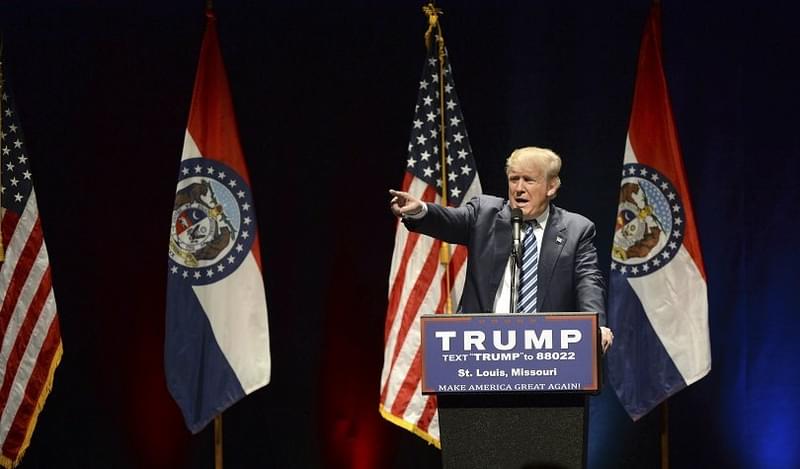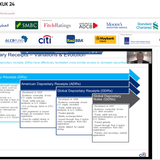The news that Donald Trump has won the US presidential election has rocked the global markets, particularly emerging markets, as many analysts had predicted that the more market-favoured Hillary Clinton would prevail.
From November 2 to 8, the Mexican peso, which has inversely tracked Trump’s ratings in the polls, had been gaining on the US dollar on market expectations of a Clinton victory.
Figures from Bloomberg show that over this time, the peso rose against the dollar from 19.3683 to 18.3226.
On the news of Trump’s victory, the peso fell from this level to its current level of 19.8442. It was down against the dollar by between 13-14% at one point, having peaked at within the 20.7 level in the early hours of the morning.
“This slight recovery in the Mexican peso has been driven by a small improvement in the risk sentiment, profit-taking on very short positions and on the fact that Mexico’s Central Bank, Banco de Mexico, is signalling that it is ready to take measures to intervene in the markets to stabilise the peso on concerns over pass-through inflation,” said Jakob Christensen, Chief Economist and Head of Research of Danske Bank.
He added that Banco de Mexico was now expected to hike rates to support the currency at its policy meeting next week.
Although the Mexican peso will arguably be one of the more susceptible currencies to the policies of a Trump presidency, it was not alone in suffering significant volatility. The more liquid EM currencies also took hits.
The Turkish lira and South African rand have been heavily affected by the result of the US presidential election, and are down by around 3% and 1.3% respectively. The lira fell from 3.1561 to 3.2030 against the dollar, whilst the rand weakened from 13.1866 to 13.4232 against the dollar according to Bloomberg.
The Chinese yuan was also down against the dollar the morning the result was announced, and the South Korean won had been one of the worst performers of the day, falling from 1,134.73 to 1,149.26 to the dollar.
Interestingly however, alongside the peso, the lira and rand have recovered slightly from morning lows of within the 3.2 and 13.7 areas respectively.
Christensen noted that the currencies’ rebound was partly because market sentiment had eased slightly since the news of Trump’s victory, largely on the conciliatory tone of the president-elect’s acceptance speech, leading the markets to believe that a Trump presidency will not be as bad as feared.
The yuan also began to gain on the dollar on improving market sentiment, rising from 6.7870 to 6.7825 to the dollar.
One senior investor noted that we do not yet know who Trump is. “He could either be the character we have seen on the campaign trail, or a much more ‘respectable’ candidate when in office.”
Other currencies have remained remarkably resilient against the market reaction to Trump’s victory. Central Eastern European (CEE) currencies have been trading at fairly stable levels. The Polish zloty fell slightly, albeit only from 3.9303 to 3.9402 to the dollar, which was part of a broader fall since the beginning of November. The Hungarian forint meanwhile only fell from 276.79 to 276.87, according to Bloomberg.
Russia’s rouble even strengthened versus the dollar, rising from 63.8114 to 63.2772 to the dollar.
“The resilience of the CEE and Russian currencies is partly due to the fact that these countries have very limited trade exposure to the US. For example, Poland and Hungary mainly export to Western Europe and in particular Germany.”
It is not only EM currencies that have been affected however. Unsurprisingly, the dollar fell sharply against G20 currencies, although has recovered against the euro slightly – from 1.1026 to 1.1019 to the euro – again on the markets revising their outlook on what a Trump presidency might entail.
Nevertheless, a Trump victory is still expected to do the dollar more harm than good. “Our view is that the dollar will suffer under the new administration. We see the dollar weakening more permanently,” Christensen said.
In addition to a weakening dollar, and expectations that the US Fed will now keep rates on hold in December (expectations of a hike are now below 50%), could actually benefit certain EMs.
A weakened dollar makes the servicing costs of any dollar-denominated external debts owned by Russian and CEE countries slightly cheaper, as their currencies have not moved much in relation to the greenback.
Russian and CEE currencies have remained stable despite volatility elsewhere on the global markets following Trump’s victory because of small trade ties. The same cannot be said for other EMs, meaning they are likely to suffer a much more turbulent ride through Trump’s presidency.
“Any tightening of US trade policy by the new administration will not affect these countries in the way it will affect nations like Mexico, Colombia and some Asian states,” Christensen stated, adding that this, alongside foreign policy, were the main market concerns. “How this develops is critical for EMs.”
Trump’s character will significantly impact investments in vulnerable economies. The investor stated that with a rational Trump, there could still be a NAFTA, albeit a slightly renegotiated one. Mexican growth would not be too badly affected and the current account deficit in Mexico would likely remain at around 3%.
He also added that there were some companies in Mexico that could actually benefit if Trump turns out to be a ‘respectable’ character in office.
“However, with the irrational Trump, although Congressional checks and balances will limit his choices domestically, with executive powers he could exit NAFTA with just 6 weeks’ notice – which would be massively negative in Mexico and would limit investment in the country. Limiting remittances would also increase Mexico’s current account deficit from 3% to 4-4.5%.”
Although most Asian oil-exporting nations are less exposed to the US, such as Indonesia and Malaysia (with only 9.4% of total exports going to the US), Vietnam and Cambodia are much more at risk, with over one-fifth of their exports destined for the States.
“Asian economies that are focussed on manufacturing will be hurt badly, but only if Trump turns out to be the character we have seen in the presidential race,” the investor continued.
Parts of Latin America are also notably susceptible to a trade-war. Mexican exports to the US constitute 80% of total exports, in Ecuador and Colombia the figures are 39% and 28% respectively.
Other parts of the region are likely to fare much better however. In Argentina and Brazil, the amount of exports is much smaller at less than 6%.
Alongside Mexico, one of Trump’s main trade targets has been China. However concerns regarding US-Chinese trade ties are at least for now premature, despite Trump’s rhetoric.
“Trump cannot afford an all-out trade war with China because it is such an important market even for US companies and consumers. He will tread carefully on this issue,” Christensen said.
Alongside a new trade policy, the Trump administration is likely to differ from the current administration of foreign policy – which has again stirred market concerns.
“Trump’s line on foreign policy, and particularly NATO, could impact the otherwise relatively immune CEE countries. The geopolitical risk of a weakened NATO may be negative for the Baltics and for neighbouring countries in the region,” said Christensen, adding that we will have to see how this plays out, but it is certainly a concern.
Changes to foreign policy in Asia could also cause short-term trouble for some Asian nations, again regarding defence. “The poor performance of the South Korean won is a sign that the markets are concerned with some of these geopolitical risks.”
Overall, although fears may subside in the US following the news that Trump will be the next President of the US, there will be a permanent effect on many EMs if policies mentioned during his campaign translate into government policy when Trump is in office, according to Christensen.
Although comparisons have been drawn between Trump’s surprising win and the unexpected decision by the UK to leave the EU in June, and the market volatility that followed both, Trump’s victory poses a much greater risk to EMs.
“I was more relaxed about the risk for EM following Brexit, and even saw it as a buying opportunity,” Christensen concluded. “However, the US market is much more important for EMs than the UK’s market, making Trump’s line on trade and foreign policy a much greater threat to certain EMs going forward.”
Nevertheless, the investor added that they thought we will see a much ‘calmer’ Trump in office, rather than the irrational character witnessed during the presidential campaign, but added that until Trump’s term actually starts, there would be considerable market uncertainty.









